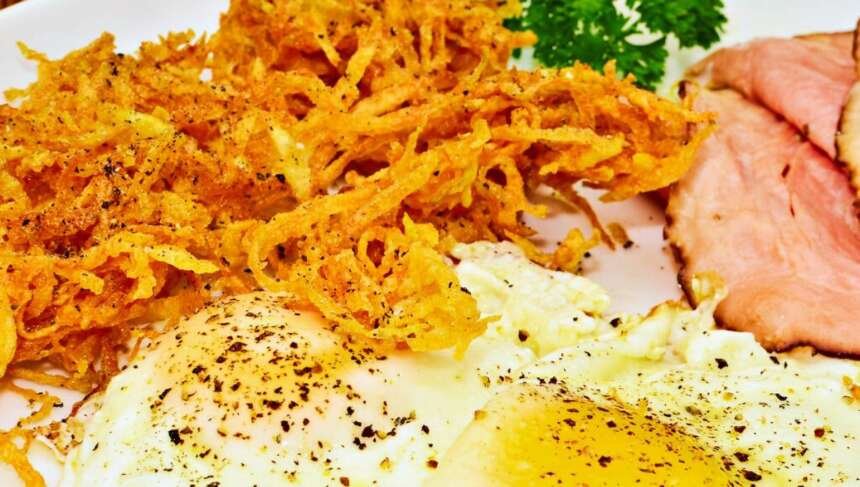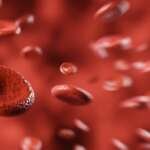Hash browns are a common potato dish often served at breakfast places and fast food places throughout the United States. Have you ever wondered what they’re made of and are they really good for you? Keep reading to learn the nutritional information and potential benefits of these crunchy and delicious treats.
What are Hash Browns?
Hash browns are basically shredded or riced potatoes that you fry or bake until they turn into delicious crispy patties or pancakes. To get that perfect texture, you grate and chop the potatoes, squeeze out excess moisture, and voila! When they are cooked you get fluffy inside and crispy outside.
Hash browns are highly versatile – you can cook them plain, mix them with onions, peppers, cheese, or whatever you like. They’re great as a base for Eggs Benedict and other delicious breakfast foods. You can even make hash brown casserole!
These delicious treats actually started out as shredded potato pancakes in Europe before hitting American restaurants, fast food places, and our own kitchen tables.
Nutritional Profile and Facts
A standard 1⁄2 cup serving (about 71g) of pan fried hash browns without added fat or toppings contains:
- Calories: 154
- Fat: 0.36g
- Sodium: 310mg
- Carbohydrates: 26g
- Fiber: 2g
- Sugars: 1g
- Protein: 3g
Hash browns offer a hefty dose of carb-based energy from their potato content. Their macronutrient ratio is dominated by complex carbohydrates rather than fats or proteins.
They also contain vitamin C, iron, calcium, vitamin B6 and magnesium. The exact micronutrient amounts can vary based on preparation methods, added toppings and oils or fats used for frying.
Nutrition Tips
Bake instead of fry hash browns. By using less fat and oil, baking instead of frying cuts calories and harmful lipids that can cause inflammation and heart disease. Acrylamide, a harmful chemical created when heating starchy meals at high temperatures, is reduced by baking. Shredded potatoes should be tossed with a little oil, put on a lined sheet, and baked at 425°F, flipping once, until golden and crispy.
Potential Health Benefits
1. Energy Boost
With over half the calories coming from carbohydrates, hash browns can provide a great energy boost to start your day. The complex carbs break down more slowly into glucose, giving you lasting energy compared to simple carbs like sugar that cause a spike then crash.
The iron, B vitamins and magnesium also support energy production and may help combat fatigue and tiredness as well. Leaving the skins on the potatoes boosts fiber too which stabilizes energy levels.
2. Immunity
Hash browns supply vitamin C, an antioxidant that is integral for immune system health. Getting enough vitamin C protects against infections and illness. It also aids collagen production for wound healing and healthy skin and tissues. [Source]
3. Heart Health
Hash browns contain very little saturated fat on their own without added butter, oil or cheese toppings. Choosing leaner cooking methods like oven roasting over deep frying makes them a relatively heart healthy choice. Fiber from the potato skins also helps lower LDL bad cholesterol.
The B6 vitamin lowers homocysteine, an inflammatory compound that damages arteries. And potassium balances electrolytes for healthy blood pressure.
4. Better Digestion
If you struggle with digestive issues like constipation, hash browns can help get things moving thanks to their fiber content. Fiber adds bulk to stools, encouraging regular bowel movements and prevention of hemorrhoids. It also feeds the healthy gut flora in your intestines. [Source]
5. Muscle & Nerve Function
The B vitamins including B6, along with magnesium and potassium are all essential for proper muscle and nerve signaling and preventing leg cramps. After a tough workout, hash browns can help relax muscles and restore electrolytes lost through sweat. [Source]
6. Brain Health Support
Many of the key nutrients in hash browns including vitamin C, B vitamins, magnesium, potassium and antioxidants have shown benefits for protecting cognitive abilities and reducing dementia risks as we age. They support blood flow, neurotransmitters and neuron health in the brain. [Source]
Potential Downsides to Consider
Like most indulgent carby sides, hash browns do come with some potential negatives to keep in mind:
1. High Sodium
Even made from scratch, hash browns contain quite a bit of sodium at nearly 25% your RDI per serving. Deep fried frozen varieties or restaurant hash browns can run even higher upwards of 500-1000mg sodium when loaded with salt and oil. This may exacerbate high blood pressure. [Source]
2. Acrylamide Concerns
Cooking starchy foods like potatoes on high heat (over 120°C) causes a chemical called acrylamide to form which may increase cancer risks when consumed in excess. Acrylamide forms in the browned crusty edges of hash browns. [Source]
3. Nutrients Lost in Processing
Grating and shredding potatoes then squeezing out all moisture definitely impacts its nutrient density. Water soluble nutrients like vitamin C and B vitamins are depleted through this processing and preparation. Roasting instead of frying reduces acrylamide formation but still impacts nutrition.
4. Fried Varieties High in Fat
While plain pan fried hash browns are low in fat, most restaurant versions get that tantalizingly crispy texture from being deep fried in oil or cooked with generous amounts of butter or oil. This ramps up the total fat and calorie counts significantly, along with hidden risks for oxidation and inflammation.
5. Carb Overload
For those limiting carbs on keto or low carb diets, hash browns would definitely overload your daily carb budget due to their high starch content. Around 70-80% of their calories come straight from carbs.
Nutrition Tip
Add nutritious toppings. Use healthy toppings instead of bacon, sausage, and cheese on hash browns. Add salsa, avocado, sautéed onions and peppers, wilted spinach, or a poached egg to cooked hash browns for fiber, antioxidants, vitamins, and minerals. Greek yogurt and spicy sauce are tasty toppings. This adds nutrition without salting or frying potatoes.
The Bottom Line
Weighing both the potential advantages and downsides, hash browns do have some nutritional merit and health benefits to offer despite being a classic comfort food you may feel guilty indulging in.
In moderation, they can provide steady energy, vitamins and minerals important for overall wellbeing. When not doused in oils or salt, they make for a hearty and generally healthy potato dish that gives you permission to eat carbs in the morning!
Just be mindful of sodium contents, cooking methods and any extra add-ons turning this simple shredded spud into a gut bomb. Keep them as a once in awhile treat, choose roasted over fried and stick to reasonable portions to enjoy their perks while avoiding potential pitfalls.
At the end of the day, hash browns have earned their place alongside pancakes and toast on the breakfast table thanks to their energizing carbohydrates and classic comfort food appeal!








